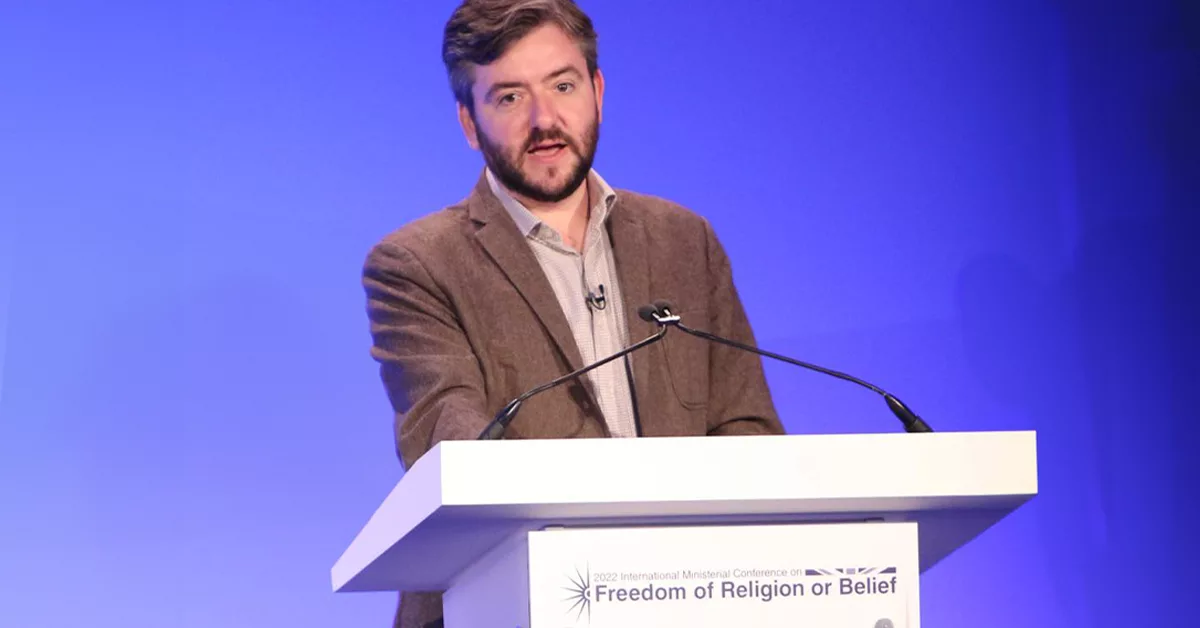
A question from an MP asking the Prime Minister if he would support the reintroduction of a form of blasphemy law in England and Wales has drawn widespread criticism from all political quarters, including the Leader of the Opposition, media outlets, and many across social media.
Humanists UK expressed concern about the proposal – and has written to the Government about it. Reassuringly, in September 2024, the Government stated its position as a vow to ‘never inhibit’ free expression around religions.
What happened in Parliament
To coincide with Islamophobia Awareness Month, the Labour MP for Birmingham Hall Green, Tahir Ali, asked the Prime Minister in Prime Minister’s Questions (PMQs) if he would consider laws to ban the ‘desecration’ of holy books or the ‘great prophets of the Abrahamic religions’. He asked his question with reference to a UN resolution proposed by Pakistan and long promoted by China, Russia, and the Islamic states and recently passed to the effect that such desecration be prohibited.
What Mr Ali requested would undoubtedly be classed as a blasphemy law. Such laws are unacceptable in any society, and fundamentally incompatible with international human rights law. As countless expert reports at the UN have attested, such laws promote religious and ethnic tensions and encourage criminal violence by justifying blasphemy as a legitimate motive for reprisals. Instead, in a free society, we all must accept sometimes being offended.
Although a Labour MP, Mr Ali is not a part of the Government and does not speak for it. The Prime Minister sidestepped the direct question – usually, in PMQs, this is seen as a gentle ‘no’ – but did say that the Government was committed to tackling Islamophobia and that he condemned acts of desecration.
I hope and personally suspect, given Humanists UK’s close monitoring of this policy area, that the PM was indirectly restating government policy as stated to the Network of Sikh Organisations a few weeks ago, which contained a promise to ‘never inhibit the lawful right to freedom of expression’ – including the freedom to discuss and critique religion – and which categorically rejected any calls to place the APPG definition of Islamophobia on a statutory footing, since this approach was plainly ‘not in line with the Equality Act 2010’.
This would suggest to my ears that the UK Government is committed only to measures to tackle hate crime and discrimination on our streets that comply with the United Nations’ Rabat Plan of Action, which provides guidelines on protecting free expression while tackling hatred. As it happens, just a few days ago the UN Secretary-General urged all nation states to take this exact approach.
Wider context
One of the proudest moments of my career in human rights and equality campaigning came in 2008 when England and Wales, under the last Labour government, abolished blasphemy as a crime for all the above-stated reasons.
Since then, Humanists International has co-led a campaign which has prompted the repeal of similar ‘dead letter’ laws in 11 jurisdictions across Europe, North America, and Australasia. Scotland is among the most recent to follow suit, with Scottish legislation to decriminalise blasphemy taking effect earlier this year.
Even countries with so-called dead letter blasphemy laws, simply by having them, provide cover to human rights-abusing states like Saudi Arabia and Pakistan which defend their laws on the basis of similar laws in Europe. That is why it matters that Northern Ireland still has a blasphemy law.
More protections needed for free speech
Even in countries where blasphemy is already decriminalised, such as England and Wales, the state has a further duty not to legitimise these kinds of unreasonable grievances. Accusations of blasphemy, particularly when taken seriously by the authorities, frequently inspire mob violence and death threats. It was the mishandling of such accusations in Batley and then Wakefield which inflamed those situations. The Wakefield incident saw a family fear for their safety, and a boy suspended from school with a tarnished police record, following on from an innocent school corridor mishap. And years on from the Batley situation, an innocent man remains in hiding for his life.
All this demands a serious response – supporting the rule of law, not undermining it. Dame Sara Khan’s Social Cohesion Review in March suggested the Government needed to do more to tackle ‘freedom-restricting harassment’ stemming from anti-blasphemy incitement and violence. Lord Walney’s review of political violence and extremism in May this year recommended that the government create legal protection for teachers against blasphemy accusations as a measure to prevent further such incidents. We would ask that the Government take these recommendations on board, much as the Home Office did so quickly last year in response to Humanists UK’s request for new statutory police guidelines.
What Mr Ali’s question has helpfully illuminated is the depth of support for freedom of expression in the UK. This should give confidence to the Government, as well as trade bodies and NGOs, to take strong stances in favour of free expression. For example, Humanists UK has recently urged the Advertising Standards Authority to modernise its code to prevent arbitrary, inconsistent rulings based on blasphemy law-like provisions. And Northern Ireland Humanists likewise is urging the Northern Ireland Executive to abolish the crime of blasphemy there too, once and for all.
Freedom of expression, especially in matters of religion, has been hard-won over decades of struggle and needs to be robustly defended now.
